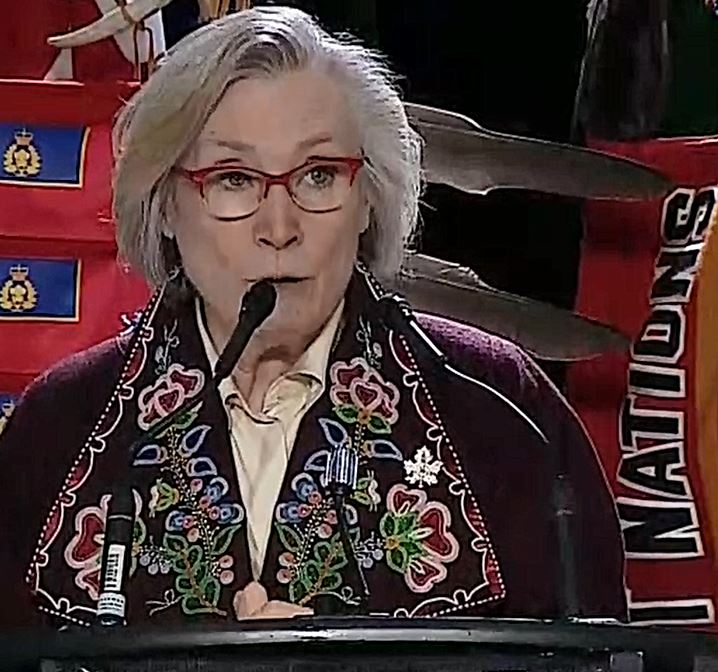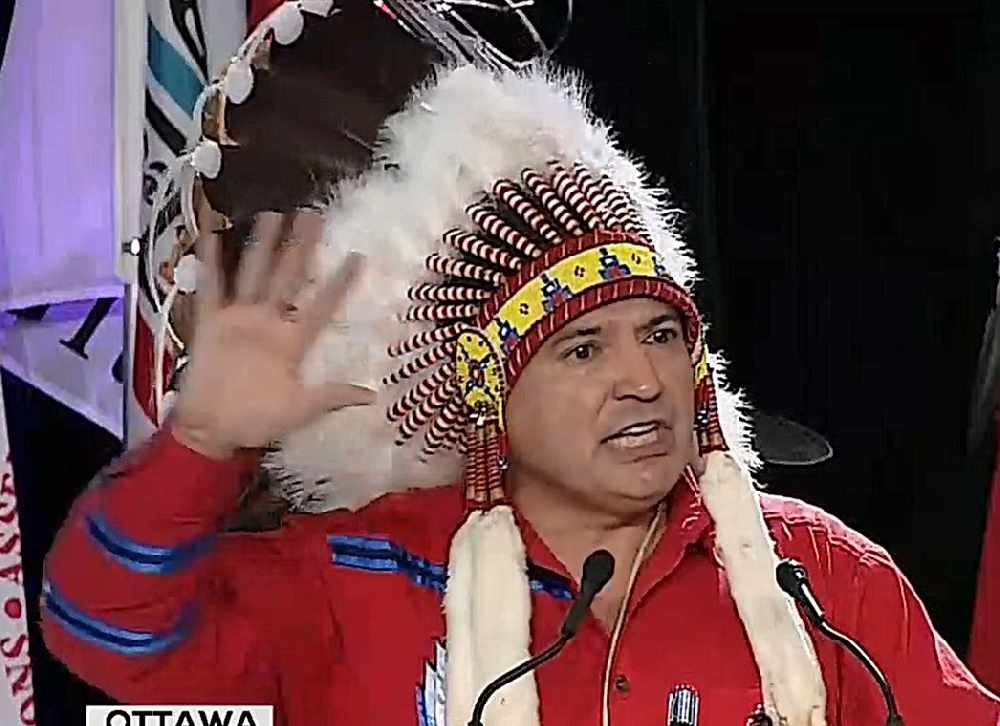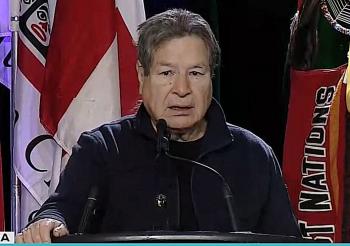Image Caption
Summary
Windspeaker.com Contributor
OTTAWA
Chiefs did not voice opposition last week to Prime Minister Justin Trudeau or Crown-Indigenous Relations Minister Carolyn Bennett, who both said work would continue on the much reviled rights and recognition framework. The pair spoke at the Assembly of First Nations Special Chiefs Assembly held Dec. 4 to Dec. 6 in Ottawa.
Silence on that topic, said Gord Peters, deputy grand chief of the Association of Iroquois and Allied Indians, was not surprising considering the lack of time for questions following Trudeau’s address and a lack of confidence in Bennett.
“We had some (chiefs) that were in line but they never got to the mics and that’s standard practise for the AFN. They bring in these ministers and they get to make their speeches and do their stuff and we don’t get to talk to them,” Peters said. About 20 chiefs were left standing with only four able to ask questions of Trudeau.
“The national chief talks about this great access to the Prime Minister. Access is not having him come there and talk to us for 10 minutes and take a couple of questions. That’s not access. Access is being able to sit down and begin a process of trying to figure out how we work together.”
Peters says it also doesn’t help set the mood to question Trudeau when National Chief Perry Bellegarde introduces the Prime Minister with a list of his accomplishments and lauds him for his speech at the United Nations where he admitted Canada’s poor treatment of Indigenous peoples.
While more chiefs were able to address Bennett, the framework never came up.
“Nobody has any confidence in her. Her message is the same and she started back in March when she started this initiative,” said Peters.

Crown-Indigenous Relations Minister Carolyn Bennett
“She has a real convoluted dialogue with you that sometimes she’s all over the map. So people don’t have any real need to speak with her any longer.”
R. Donald Maracle, chief of Mohawk of Bay of Quinte, and Delaware Nation Chief Denise Stonefish did, however, introduce a resolution speaking to chiefs’ opposition to the rights and recognition framework.
Major amendments were made to the original resolution, “Rejection of the Recognition and Implementation of Indigenous Rights Framework and Associated Processes.” The first version went out in chiefs’ packages prior to the assembly.
That resolution was amended significantly, and the new version passed. It called for a meeting with Trudeau to discuss “a new beginning” for First Nations to determine for themselves how they will move forward on self-determination. It also called for the AFN to arrange a meeting so chiefs can develop common principles on moving forward.
Stonefish said the original resolution primarily addressed the situation of Ontario First Nations, which have treaties.
“We were able to sit down with a couple of the leaders from other provinces and their technicians to come up with a final resolution that would best address our concerns collectively,” she said. The amended resolution took into consideration the fact that most British Columbia First Nations do not have treaties.
“I thought it was a good dialogue,” said Peters, who led the discussions. “I think the best thing that came out of that session at AFN was that we’re starting to make connections. For us, we’ll start to make greater connections with the Quebec region. We made greater connections with treaty groups out in the west.”
Neither Peters nor Stonefish are confident that this recent resolution will drive change at the federal government level. It is not the first such resolution from the AFN.
At the July Special Chiefs Assembly, Ontario chiefs introduced a resolution calling for a halt to the process stating that the framework and associated processes “undermine the true Nation-to-Nation relationship between First Nations and Canada.”
Across the country, other First Nation organizations, including the Union of British Columbia Indian Chiefs and the Alberta Assembly of Treaty Chiefs, have rejected the framework. Youth have also expressed their opposition, with about 400 young people joined by chiefs to march on Parliament Hill on Dec. 4.
Peters also contends that Bellegarde is holding up the process for change.

National Chief Perry Bellegarde
“As far as I’m concerned AFN has not carried its role in this process. They haven’t been supportive of the community processes,” he said. “(The government is) going to carry on their own path with their own processes and unfortunately it appears the national chief is part of that process.”
Prior to the amended resolution being passed, Regena Crowchild, proxy from Tsuut’ina Nation, questioned Bellegarde on his role.
“I'd like to know how AFN, how are you going to deal with this? National Chief, how are you going to deal with this? You know we rejected the Framework proposal and yet the Prime Minister tells us yesterday that he is going to move forward with it. So how are you going to deal with it?” she said.
Bellegarde said his role was not to take a position.
“We take direction from the chiefs. Whatever resolution you pass we will follow. That’s the position. That’s our job,” he said.
However, Peters says according to the AFN’s constitution, the national chief is supposed to “warn the chiefs of danger… and that’s what he should be doing. He should be cautioning people.”
Following the assembly, chiefs representing Treaty 5, 6, 7, and 11 issued a statement saying, in part, “The National Chief has no mandate to manufacture consent. He has no authority to sign MOUs that will jeopardize the rights of the future generations. Our Nations who entered into international Treaties with the Queen of Great Britain and Ireland will speak for ourselves.”
The resolution also calls for First Nations to “take all necessary steps to prevent the framework from being unilaterally legislated.”
Among those steps, says Stonefish, is First Nations gathering as regions to “establish how we’re going to solidify our approach.”
Whatever action is taken, she stresses, it will not be detrimental to First Nations.
“We don’t want to do anything that’s going to do or cause any harm to anybody or cause any undue financial risks or costs regarding stopping the framework,” she said.
Peters says AIAI is in the process of drafting correspondence to go to Bellegarde, Trudeau, Bennett and Justice Minister Jody Raybould-Wilson stating that a pan-Aboriginal approach to any government process is not acceptable.
A meeting is also planned for Dec. 18 in Toronto where all Ontario First Nations will be gathering to plan how to move forward.
“Whether or not government knows, this has been good for us in terms of having to build allies and relationships again,” said Peters.

